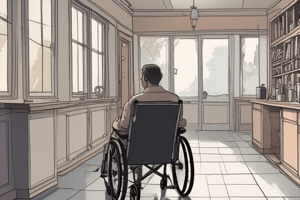Podcast
Questions and Answers
Match the type of lesion with its characteristic:
Match the type of lesion with its characteristic:
Primary Lesion = Originates on previously healthy skin Secondary Lesion = Evolution of primary lesion Chronic Wound = Impaired wound healing due to medical conditions Acute Wound = Enhanced immune response with pro-inflammatory mediators
Match the feature with the type of wound:
Match the feature with the type of wound:
Infection = Acute Wound Hypoxia = Chronic Wound Heightened immune response = Acute Wound Impaired tissue healing = Chronic Wound
Match the type of cell with its function in the healing process:
Match the type of cell with its function in the healing process:
Neutrophils = Migration to the injury site Mast cells = Promoting vasodilation to recruit more immune cells Macrophages = Differentiation from monocytes Epithelial cells = Proliferation in the healing process
Match the drug with its effect on wound healing:
Match the drug with its effect on wound healing:
Match the condition with its effect on wound healing:
Match the condition with its effect on wound healing:
Match the mediator with its function in the healing process:
Match the mediator with its function in the healing process:
Match the characteristic with the type of lesion:
Match the characteristic with the type of lesion:
Match the phase with the process in wound healing:
Match the phase with the process in wound healing:
Flashcards are hidden until you start studying
Study Notes
Physical Trauma and Lesions
- Characteristics of lesions: different from surrounding skin, usually benign and harmless but may progress to become malignant
Types of Lesions
- Primary Lesion: originates on previously healthy skin, associated with a direct cause
- Secondary Lesion: evolution of primary lesion, due to physical assault or treatment progression
Healing Process
- Immune response to injury involves: • Release of pro-inflammatory mediators • Monocytes differentiating • Migration of neutrophils and macrophages • Mast cells promoting vasodilation to recruit immune cells • Epithelial cells proliferating
Acute Wounds
- Features: • Infection, decreased angiogenesis, impaired tissue healing • Heightened immune response with: • Enhanced mast cells, TC, and TH cells • High levels of pro-inflammatory mediators (e.g., TNF, KGF) leading to poor tissue proliferation, vascularization, and tissue fibrosis
Chronic Wounds
- Impaired wound healing due to medical conditions: • Hypoxia, infection, smoking, alcohol, obesity, diabetes, myocardial infarction, immunocompromised patients, etc.
- Impaired wound healing due to drugs: • Glucocorticoids, NSAIDs, anti-platelets, anti-coagulants, cytotoxic agents (e.g., chemotherapy, immunosuppressants, immunomodulators), illicit substances, etc.
Studying That Suits You
Use AI to generate personalized quizzes and flashcards to suit your learning preferences.




